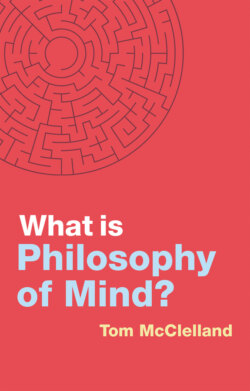What is Philosophy of Mind?

Реклама. ООО «ЛитРес», ИНН: 7719571260.
Оглавление
Tom McClelland. What is Philosophy of Mind?
CONTENTS
Guide
List of Tables
Pages
Polity’s What is Philosophy? series
What is Philosophy of Mind?
Acknowledgements
1 The Mind and Its Problems. 1.1 Philosophizing about the Mental
1.2 A Whistle-Stop Tour of the Mind
1.3 The Mark of the Mental
1.4 The Three Big Questions
1.4.1 The Mind and Matter Question
1.4.2 The Knowledge Question
1.4.3 The Distribution Question
1.5 A Plan of Action
Key Concepts
References and Further Reading
2 Descartes’ Dualism. 2.1 The Mechanical Philosophy
2.2 The Case for Substance Dualism. 2.2.1 Extended Substance and Thinking Substance
2.2.2 The Conceivability Argument for Substance Dualism
2.2.3 The Empirical Argument for Substance Dualism
2.3 Dualism and the Three Big Questions
2.3.1 The Mind and Matter Question
2.3.2 The Knowledge Question
2.3.3 The Distribution Question
Key Concepts
References and Further Reading
3 The Materialist Turn. 3.1 The Materialist Turn in Context
3.2 The Case for Behaviourism
3.3 Behaviourism and the Three Big Questions. 3.3.1 The Mind and Matter Question
3.3.2 The Knowledge Question
3.3.3 The Distribution Question
3.4 The Case for Identity Theory
3.5 Identity Theory and the Three Big Questions. 3.5.1 The Mind and Matter Question
3.5.2 The Knowledge Question
3.5.3 The Distribution Question
Key Concepts
References and Further Reading
4 Functionalism and the Computer Revolution. 4.1 Functionalism in Context
4.2 The Case for Functionalism
4.3 Functionalism and the Three Big Questions. 4.3.1 The Mind and Matter Question
4.3.2 The Knowledge Question
4.3.3 The Distribution Question
Key Concepts
References and Further Reading
5 The Problem of Consciousness. 5.1 Inconvenient Truths
5.2 Three Arguments Against Materialism
5.2.1 The Zombie Argument
5.2.2 The Spectrum Inversion Argument
5.2.3 The Knowledge Argument
5.3 Dualism and Illusionism
5.4 Property Dualism, Illusionism and the Three Big Questions. 5.4.1 The Mind and Matter Question
5.4.2 The Knowledge Question
5.4.3 The Distribution Question
5.5 Some Final Thoughts on Consciousness
Key Concepts
References and Further Reading
6 The Mind Today. 6.1 The Interdisciplinary Study of the Mind
6.2 The Three Big Questions Today
6.2.1 The Mind and Matter Question
6.2.2 The Knowledge Question
6.2.3 The Distribution Question
6.3 The Future of the Mind
Key Concepts
References and Further Reading
Index. A
B
C
D
E
F
I
K
M
O
P
R
S
T
U
W
Z
POLITY END USER LICENSE AGREEMENT
Отрывок из книги
Stephen Hetherington, What is Epistemology? Tom McClelland, What is Philosophy of Mind?
Dean Rickles, What is Philosophy of Science? James P. Sterba, What is Ethics?
.....
A more promising proposal is that the mark of the mental is intentionality. The word ‘intentionality’ sounds like it should have something to do with a person’s intentions, but this appearance is misleading. The word is derived from medieval Latin, and to have intentionality is to be about something. Mindy’s perceptual experience, for example, is a perception of the football. So although her perceptual state is something in her mind, that state is about something beyond itself, namely the football. We can call the target of an intentional state an intentional object. Going through Mindy’s other mental states, it’s not too hard to pick out their intentional objects. Her achy feeling is about her muscles, her excitement is about her prospective goal, her desire is about scoring and her belief and memory are about the goalkeeper. In contrast, Mindy’s non-mental states don’t seem to be about anything. Mindy’s height and muscle fatigue aren’t about anything – they just exist without pointing beyond themselves.
An interesting feature of intentionality is that something can have an intentional object even when that object does not exist. A desire to find the Holy Grail is about the Holy Grail, even if no such object exists. A perceptual experience of a floating dagger is about a dagger, even though no such dagger is present. A belief in fairies is about fairies, even though there are no such creatures. We can make sense of this distinctive feature of intentionality by making an analogy with paintings. Some paintings are paintings of real things. Holbein’s portrait of Henry VIII, for example, is of a real flesh-and-blood person. Other paintings are not of real things. Burne-Jones’s painting The Beguiling of Merlin is a painting of Merlin, even though no such magician exists. So the fact that a painting is about something does not entail that thing exists. Similarly, a mental state being about something does not entail that thing is real. Mental states and paintings both point beyond themselves to something else, and they can do so regardless of whether there’s anything real they are pointing to (this feature of intentionality is a philosophical rabbit hole down which we won’t be going, but some readings that do venture down the hole can be found at the end of the chapter).
.....